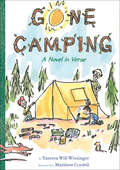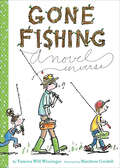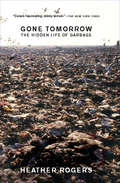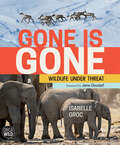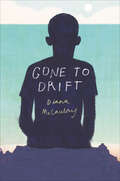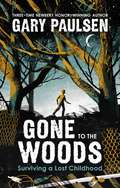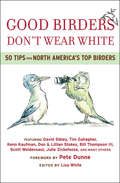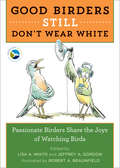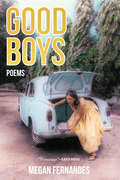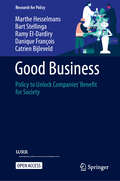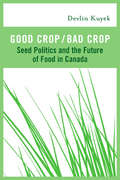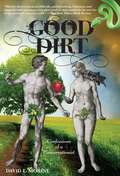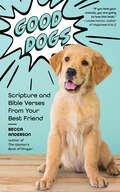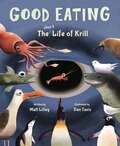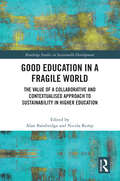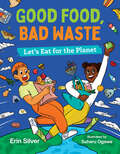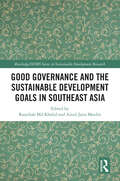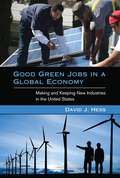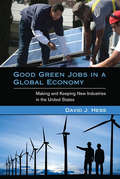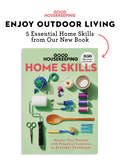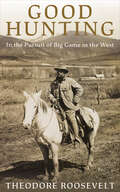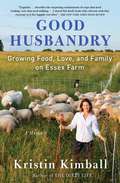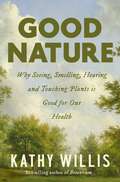- Table View
- List View
Gone Camping: A Novel in Verse
by Matthew Cordell Tamera Will WissingerHiking in the great outdoors, catching fish, watching the stars come out at night—camping is fun. Until it’s time to sleep. Then, Lucy wonders, what kinds of creatures lurk in the dark? With only her brother and grandpa as tent-mates, will Lucy be able to face her camping fears? Filled with a variety of poetic forms—from aubade to haiku—as well as exuberant art and helpful writing tips about rhyme and rhythm, this entertaining companion to the award-winning Gone Fishing is packed with family humor and adventure. So grab a flashlight and get settled in to experience the joy of campfires, s’mores, and storytelling!
Gone Fishing
by Earlene R. LongA father and son go fishing with a big fishing rod for daddy and a little one for the child.
Gone Fishing: A Novel (Into Reading, Trade Book #9)
by Matthew Cordell Tamera Wissinger Tamera WizssingerNIMAC-sourced textbook. Nine-year-old Sam loves fishing with his dad. So when his pesky little sister, Lucy, horns in on their fishing trip, he’s none too pleased. All ends well in this winsome book of poems—each labeled with its proper poetic form. Together the poems build a dawn-to-dusk story of a father-son bond, of sibling harmony lost and found—and, most of all, of delicious anticipation. Charming line drawings animate the poetry with humor and drama, and the extensive Poet’s Tackle Box at the end makes this the perfect primer to hook aspiring poets of all ages.
Gone Fishing: A Novel in Verse
by Tamera Will WissingerNine-year-old Sam loves fishing with his dad. So when his pesky little sister, Lucy, horns in on their fishing trip, he’s none too pleased: “Where’s my stringer? / Something’s wrong! / The princess doll does not belong!” All ends well in this winsome book of poems—each labeled with its proper poetic form, from quatrain to tercet. Together the poems build a dawn-to-dusk story of a father-son bond, of sibling harmony lost and found—and most of all, of delicious anticipation. Charming line drawings animate the poetry with humor and drama, and the extensive Poet’s Tackle Box at the end makes this the perfect primer to hook aspiring poets of all ages.
Gone Tomorrow: The Hidden Life of Garbage
by Heather Rogers&“A galvanizing exposé&” of America&’s trash problem from plastic in the ocean to &“wasteful packaging, bogus recycling, and flawed landfills and incinerators&” (Booklist, starred review). Eat a take-out meal, buy a pair of shoes, or read a newspaper, and you&’re soon faced with a bewildering amount of garbage. The United States is the planet&’s number-one producer of trash. Each American throws out 4.5 pounds daily. But garbage is also a global problem. Today, the Pacific Ocean contains six times more plastic waste than zooplankton. How did we end up with this much rubbish, and where does it all go? Journalist and filmmaker Heather Rogers answers these questions by taking readers on a grisly and fascinating tour through the underworld of garbage. Gone Tomorrow excavates the history of rubbish handling from the nineteenth century to the present, pinpointing the roots of today&’s waste-addicted society. With a &“lively authorial voice,&” Rogers draws connections between modern industrial production, consumer culture, and our throwaway lifestyle (New York Press). She also investigates the politics of recycling and the export of trash to poor countries, while offering a potent argument for change. &“A clear-thinking and peppery writer, Rogers presents a galvanizing exposé of how we became the planet&’s trash monsters. . . . [Gone Tomorrow] details everything that is wrong with today&’s wasteful packaging, bogus recycling, and flawed landfills and incinerators. . . . Rogers exhibits black-belt precision.&” —Booklist, starred review
Gone is Gone: Wildlife Under Threat (Orca Wild #2)
by Isabelle GrocWhy do species become endangered? How are scientists learning about endangered wildlife? What are people doing to conserve species and how can young people help? This book is richly illustrated with unique photos that Isabelle has taken over many years of observing endangered species in the field alongside the people who work to conserve them. Throughout, the author shares enchanting encounters and personal field stories: watching narwhals socialize in the Canadian Arctic, getting close to a Laysan albatross raising chicks on a remote Hawaiian island, spotting a rhinoceros on safari and even swimming with sea lions in the Galápagos Islands. Gone is Gone will inform, intrigue and inspire readers to take small steps toward big changes for endangered species around the world. The epub edition of this title is fully accessible.
Gone to Drift
by Diana McCaulay“McCaulay’s prose is lyrical. A solemn adventure about resolve, loyalty, and family, that gives readers insight into life in a small fishing community and brings to light the dangers marine life face in the wild.” — School Library Journal“The relationships between boy and elder, man and sea, crime and poverty all lift McCaulay’s first children’s novel into a different league. Beautiful.” — Kirkus Reviews (starred review)“The heartbreaking realism of this story of innocence lost at sea truly sets this novel apart.” — Bulletin of the Center for Children’s Books“This makes a good choice for adventure fans, the eco-conscious, and those hoping to understand the economic hardships faced by those who make their living from the sea.” — Booklist“Gone to Drift is a compelling coming-of-age story with a strong sense of place and culture.” — Voice of Youth Advocates (VOYA)
Gone to the Woods: Surviving a Lost Childhood
by Gary PaulsenA mesmerizing memoir from three-time Newbery Honor–winning author Gary Paulsen—whose books have sold over 35 million copies worldwide—giving readers a new perspective on the origins of his blockbuster contemporary classic Hatchet and other famed survival stories.“Leaves you gritting your teeth and clutching the pages . . . Haunted me as a reader.” —The New York Times Book Review★ “This literary treasure is written for book lovers of any age.” —Shelf Awareness, starred reviewHis name is synonymous with high-stakes wilderness survival adventures. Now, beloved author Gary Paulsen portrays a series of life-altering moments from his turbulent childhood as his own original survival story. If not for his summer escape from a shockingly neglectful Chicago upbringing to a North Woods homestead at age five, there never would have been a Hatchet. Without the encouragement of the librarian who handed him his first book at age thirteen, he may never have become a reader. And without his desperate teenage enlistment in the Army, he would not have discovered his true calling as a storyteller.An entrancing and critically lauded account of grit and growing up, perfect for newcomers and lifelong fans alike, Gone to the Woods: Surviving a Lost Childhood is literary legend Gary Paulsen at his rawest and realest.Don’t miss Gary Paulsen’s other acclaimed books from Farrar Straus Giroux Books for Young Readers: the father-son comedy How to Train Your Dad and the page-turning survival adventure Northwind.
Good Birders Don't Wear White: 50 Tips From North America's Top Birders
by Kenn Kaufman Scott Weidensaul Lillian Stokes Bill Thompson III Julie Zickefoose Tim Gallagher Robert A. Braunfield Don StokesDavid Sibley, Don and Lillian Stokes, and many more share their inside tips—and witty observations—on the birding life. The biggest names in birding dispense advice to birders of every level—on topics ranging from feeding birds and cleaning binoculars to pishing and pelagic birding—in these lighthearted essays accompanied by illustrations. Whether satirizing bird snobs or relating the traditions and taboos of the birding culture, this collection of wisdom is as chock-full of helpful information as it is entertaining. &“The book is a delight to read and will generate new enthusiasm for the hobby. The 25 black-and-white line drawings are hilarious.&” —Booklist
Good Birders Still Don't Wear White: Passionate Birders Share the Joy of Watching Birds
by Kenn Kaufman Michael O'Brien Pete Dunne Bill Thompson III Julie Zickefoose Richard Crossley Robert A. BraunfieldAvid North American birders share wit, wisdom, advice, and what fuels their passion for birds. Birding gets you outside, helps you de-stress, exercises your body and mind, puts your day-to-day problems in perspective, and can be lots of fun. Birders know this, and in this collection of thirty-seven brief essays, birders from diverse backgrounds share their sense of wonder, joy, and purpose about their passion (and sometimes obsession). From the Pacific Ocean to Central Park, from the rainforest in Panama to suburban backyards—no matter what their habitat, what good birders have in common is a curiosity about the natural world and a desire to share it with others. In these delightful essays, each accompanied by an endearing drawing, devoted birders reveal their passion to be fulfilling, joyful, exhilarating, and maybe even contagious. Contributors include many well-known birders, such as Richard Crossley, Pete Dunne, Kenn Kaufman, Michael O'Brien, Bill Thompson, and Julie Zickefoose—and a portion of the proceeds goes to the American Birding Association, North America's largest membership organization for active birders.
Good Boys: Poems
by Megan FernandesIn an era of rising nationalism and geopolitical instability, Megan Fernandes’s Good Boys offers a complex portrait of messy feminist rage, negotiations with race and travel, and existential dread in the Anthropocene. The collection follows a restless, nervy, cosmically abandoned speaker failing at the aspirational markers of adulthood as she flips from city to city, from enchantment to disgust, always reemerging—just barely—on the trains and bridges and bar stools of New York City. A child of the Indian ocean diaspora, Fernandes enacts the humor and devastation of what it means to exist as a body of contradictions. Her interpretations are muddied. Her feminism is accusatory, messy. Her homelands are theoretical and rootless. The poet converses with goats and throws a fit at a tarot reading; she loves the intimacy of strangers during turbulent plane rides and has dark fantasies about the “hydrogen fruit” of nuclear fallout. Ultimately, these poems possess an affection for the doomed: false beloveds, the hounded earth, civilizations intent on their own ruin. Fernandes skillfully interrogates where to put our fury and, more importantly, where to direct our mercy.
Good Business: Policy to Unlock Companies’ Benefit for Society (Research for Policy)
by Marthe Hesselmans Catrien Bijleveld Bart Stellinga Ramy El-Dardiry Danique FrançoisThis open access book shows how governments can motivate companies to make a positive impact on society and why this is necessary in light of today&’s pressing social, economic and environmental challenges and transitions. It shows obstacles companies face in conducting socially responsible business. Focusing on government-business relations in the Netherlands, the book also exposes key policy bottlenecks: the tendency of the Dutch government to hold on to the status quo and shield incumbent firms through tax breaks and lax enforcement. There is a real risk of policies that pamper business: it hampers companies that offer societal innovations for instance for health, education or the labour market. We also show how policies can better capitalise on the innovative qualities of entrepreneurship. Effective government policy makes it worthwhile for companies to alter their business model so that their products, services and production processes benefit society. Our recommendations address the role of government, consumers, financiers and companies themselves. While this work focuses on the Netherlands, it tackles questions that countries face worldwide on how to minimise harmful business conduct and maximise good business solutions. This makes the book broadly relevant to policy makers, business leaders and researchers grappling with the impact of business on society today.
Good Crop / Bad Crop: Seed Politics and the Future of Food in Canada
by Devlin KuyekIN RECENT YEARS Canadians have become more and more concerned about the origins oftheir food and the environmental impacts of pesticides in agriculture. What is less well knownis that pesticide corporations such as Monsanto and Du Pont have bought their way into the seed industry and are taking control of what was once the exclusive domain of farmers.In Good Crop / Bad Crop, Devlin Kuyek deftly examines the economic and environmental background of the modern seed trade from a Canadian perspective. Historically seeds were viewed more as public goods than as commodities, and plant breeding objectives were widely shared by scientists, governments, and farmers. Now that approach is changing; seeds have become increasingly commodified, and plant breeding has become subject to corporate priorities. Farmers and citizens in Canada, Kuyek points out, need to heed the hard-won lessons from the developing world, where farmers greatly damaged by the much-heralded approaches of theGreen Revolution are now taking steps to reclaim control over seed supplies, food security, and their futures.
Good Dirt: Confessions of a Conservationist
by Paul Flint David E. MorineThe best-selling conservation classic, completely expanded, revised, and updated David Morine was a briefcase conservationist specializing in human nature. During his fifteen years in charge of land acquisition for The Nature Conservancy, Morine helped protect more than three million acres of wilderness, finding plenty to laugh about and learn from along the way. Here are the stories behind the deals and the people who made them—an enlightening, entertaining, occasionally unsettling look at the dirty job of keeping America clean.
Good Dogs: Scripture and Bible Verses from Your Best Friend
by Becca AndersonAdorable dog photos paired with iconic Bible verses to warm your heart and give you guidance in times of need. Verses for Daily Meditation. This selection of inspiring, holy words will help you gain a greater understanding on subjects like faith, love, strength, peace, and knowledge. Becca Anderson, author of The Women&’s Book of Prayer and Prayers for Hard Times, knows you&’ll find the truth and hope you need guided by the Lord?and everyone&’s best friend in this Christian dog book.Good Dogs is the perfect Christian inspirational gift. In this book, you&’ll find: Thought-provoking verses for encouragement and meditationClarifying explanations on every pageBeautiful, heartwarming images of all your favorite dog breedsPerfect for readers of What&’s True about You, Zen Dogs, Color the Words of Jesus, or The Psalms in ColorPraise for Good Dogs&“If you love your animals, you are going to love this book. It will remind you that the bond we share with our pets is an expression of divine love.&” —Louise Hamon, author of Happiness A to Z
Good Eating: The Short Life Of Krill
by Matt LilleyCalifornia Eureka Silver Honoree award 2022 "To my delight, your average krill is a far stranger story of metamorphosis than anything our butterflies can come up with." - Elizabeth Bird, A Fuse 8 Production A fun exploration of a tiny animal at the base of the ocean food chain Just 2 inches long full-grown, this little guy is the foundation of the Southern Ocean food chain... “Hi. What are you? You appear to be an egg. You are an egg sinking. For many days, you sink. You sink a mile down, and you keep sinking down… down… until…” The unidentified narrator follows one krill among billions as it pursues its brief existence, eating and eating while metamorphosing from one thing into another and trying to avoid being eaten. Questions and advice are hurled at the krill on every page, but the krill never responds—because, after all, krill can’t talk, and this is nonfiction. Krill are the largest animals able to catch and eat phytoplankton, and they in turn are eaten by the largest animals ever to live on earth—blue whales—as well as by seals, penguins, and a host of others. In other words, krill are really good at eating, and they make really good eating. And that makes them the most important animals in the high-latitude oceans. As in The Whale Fall Café, Dan Tavis’s illustrations combine scientific accuracy with Nemo liveliness and humor. Our star krill is so good at gobbling up phytoplankton that he turns green, so we can pick him out from the crowd racing to escape a penguin’s beak or a blue whale’s gaping maw. The book has been reviewed and endorsed by global krill expert Dr. Stephen Nichol, and the manuscript earned an honorable mention in Minnesota’s McKnight Artist Fellowships for Writers. Helpful backmatter is included. The Good Eating manuscript won an honorable mention in Minnesota’s McKnight Artist Fellowships for Writers. Technical review and endorsement from Dr. Stephen Nichol, adjunct professor at the University of Tasmania and author of The Curious Life of Krill.
Good Education in a Fragile World: The Value of a Collaborative and Contextualised Approach to Sustainability in Higher Education (Routledge Studies in Sustainable Development)
by Alan Bainbridge Nicola KempThis edited collection aims to provoke discussion around the most important question for contemporary higher education – what kind of education (in terms of purpose, pedagogy and policy) is needed to restore the health and wellbeing of the planet and ourselves now and for generations to come? The book contains contributions from colleagues at a single UK University, internationally recognised for its approach to sustainability education. Introducing a conceptual framework called the ‘Paradox Model’, the book explores the tensions that underpin the challenge of developing sustainability in higher education in the 21st century. It asks probing questions about the purpose of higher education in the 21st century given growing concerns in relation to planetary safety and justice and calls for a rethinking of educational purpose. It draws upon the theory and practice of education and explores how these can develop an understanding of sustainability pedagogies in practice. Finally, it delivers thought-provoking discussion on what constitutes a ‘good’ higher education that meets the needs of a world in crisis. Drawing on a planetary health lens, the book concludes with a ‘manifesto’ that brings together the key insights from the contributing authors. This will be an engaging volume for academics and educators from a wide range of disciplines in higher educational settings interested in translating sustainability theory into educational practice.
Good Food, Bad Waste: Let's Eat for the Planet (Orca Think #9)
by Erin SilverA deep dive into why humans waste so much food and the consequences for people and the planet Around the world, a billion tons of food gets thrown away every year, even when hundreds of millions of people suffer from hunger. A lot of what we don't eat ends up rotting in landfills which contributes to global warming. The good news is that many governments, communities and individuals are working hard to tackle this giant problem. You can be part of the solution, starting in your own home—and working together, we can decrease our overall waste and make sure all people have food security. Plus, by reducing food waste, we can also fight climate change! With inspiring profiles of food-waste activists and tasty tidbits on things like best-before dates, Good Food, Bad Waste offers much food for thought. The epub edition of this title is fully accessible.
Good Governance and the Sustainable Development Goals in Southeast Asia (Routledge/ISDRS Series in Sustainable Development Research)
by Rasyikah Md Khalid and Ainul Jaria MaidinThis book discusses management and governance initiatives undertaken by agencies and stakeholders towards achieving the Sustainable Development Goals (SDGS) in the Southeast Asian region, specifically Malaysia, Indonesia, Thailand and Singapore. It highlights the theories, methodologies and action plans involved in implementing the goals in these countries and the importance of developing a positive relationship between the public and government agencies. With contributors coming from a range of disciplines and backgrounds across the Association of Southeast Asian Nations (ASEAN) region, this edited collection provides a holistic quantitative and qualitative approach to achieving the SDGs. In order to realise these development objectives, it argues that a strong understanding of the basic principles of governance across all levels is required, supported by effective citizen participation and conflict resolution. It provides a detailed overview of the importance of governance at the country level, addressing the key elements of an integrated framework to support sustainable transitions. Regional case studies highlight processes and recommendations for improving governance and risk management and elevating citizen awareness and participation. Good Governance and the Sustainable Development Goals in Southeast Asia is a comprehensive and valuable companion for researchers, government agencies, and professionals with an interest in the SDGs in Southeast Asia and beyond.
Good Green Jobs in a Global Economy
by David J. HessGood Green Jobs in a Global Economy is the first book to explore the broad implications of the convergence of industrial and environnmental policy in the United States. Under the banner of "green jobs," clean energy industries and labor, environmental, and antipoverty organizations have forged "blue-green" alliances and achieved some policy victories, most notably at the state and local levels. In this book, David Hess explores the politics of green energy and green jobs, linking the prospect of a green transition to tectonic shifts in the global economy. He argues that the relative decline in U. S. economic power sets the stage for an ideological shift, away from neoliberalism and toward "developmentalism," an ideology characterized by a more defensive posture with respect to trade and a more active industrial policy. After describing federal green energy initiatives in the first two years of the Obama administration, Hess turns his attention to the state and local levels, examining demand-side and supply-side support for green industry and local small business. He analyzes the successes and failures of green coalitions and the partisan patterns of support for green energy reform. This new piecemeal green industrial policy, Hess argues, signals a fundamental challenge to anti-interventionist beliefs about the relationship between the government and the economy.
Good Green Jobs in a Global Economy: Making and Keeping New Industries in the United States (Urban and Industrial Environments)
by David J. HessAn examination of the politics of green jobs that foresees a potential ideological shift away from neoliberalism toward “developmentalism.”Good Green Jobs in a Global Economy is the first book to explore the broad implications of the convergence of industrial and environnmental policy in the United States. Under the banner of “green jobs,” clean energy industries and labor, environmental, and antipoverty organizations have forged “blue-green” alliances and achieved some policy victories, most notably at the state and local levels. In this book, David Hess explores the politics of green energy and green jobs, linking the prospect of a green transition to tectonic shifts in the global economy. He argues that the relative decline in U.S. economic power sets the stage for an ideological shift, away from neoliberalism and toward “developmentalism,” an ideology characterized by a more defensive posture with respect to trade and a more active industrial policy.After describing federal green energy initiatives in the first two years of the Obama administration, Hess turns his attention to the state and local levels, examining demand-side and supply-side support for green industry and local small business. He analyzes the successes and failures of green coalitions and the partisan patterns of support for green energy reform. This new piecemeal green industrial policy, Hess argues, signals a fundamental challenge to anti-interventionist beliefs about the relationship between the government and the economy.
Good Housekeeping Enjoy Outdoor Living: 5 Home Skills from Our New Book
by The editors of Good HousekeepingA special collection of essential outdoor living know-how from Good Housekeeping Home SkillsThe editors and scientists at Good Housekeeping and its lab, the Good Housekeeping Institute, share genius solutions and trusted, expert advice in this mini how-to guide. Discover how to refresh your outdoor living space, grow pretty perennials and more! Once you&’ve tried these life-changing tricks you&’ll want to get all 850+ skills found in Good Housekeeping Home Skills, a practical and attractive handbook to get anything done faster and easier.
Good Hunting: In Pursuit of Big Game in the West
by Theodore RooseveltStep into the rugged wilderness of the American West with one of history's most iconic figures, Theodore Roosevelt, in his thrilling and insightful book, Good Hunting: In Pursuit of Big Game in the West. This classic work offers readers a firsthand account of Roosevelt's adventures as a hunter, conservationist, and naturalist, capturing the essence of the wild frontier and the majesty of its big game.
Good Husbandry: A Memoir
by Kristin KimballFrom the author of the beloved bestseller The Dirty Life, this &“superb memoir chronicles the evolution of a farm, marriage, family, and her own personal identity with humor, insight, and candor&” (Publishers Weekly, starred review) detailing life on Essex Farm—a 500-acre farm that produces food for a community of 250 people.The Dirty Life chronicled Kimball&’s move from New York City to 500 acres near Lake Champlain where she started a new farm with her partner, Mark. In Good Husbandry, she reveals what happened over the next five years at Essex Farm. Farming has many ups and downs, and the middle years were hard for the Kimballs. Mark got injured, the weather turned against them, and the farm faced financial pressures. Meanwhile, they had two small children to care for. How does one traverse the terrain of a maturing marriage and the transition from being a couple to being a family? How will the farm survive? What does a family need in order to be happy? Kristin chose Mark and farm life after having a good look around the world, with a fair understanding of what her choices meant. She knew she had traded the possibility of a steady paycheck, of wide open weekends and spontaneous vacations, for a life and work that was challenging but beautiful and fulfilling. So with grit and grace and a good sense of humor, she chose to dig in deeper. Featuring some of the same local characters and cherished animals first introduced in The Dirty Life, (Jet the farm dog, Delia the dairy cow, and those hardworking draft horses), plus a colorful cast of aspiring first-generation farmers who work at Essex Farm to acquire the skills they need to start sustainable farms of their own, Good Husbandry &“considers what it means to build a good, happy life, and how we are tested in that endeavor&” (Mary Beth Keane, New York Times bestselling author of Ask Again, Yes).
Good Nature: Why Seeing, Smelling, Hearing and Touching Plants is Good for Our Health
by Kathy WillisA ground-breaking investigation into newly discovered evidence showing that remarkable things happen to our bodies and our minds when our senses connect with the natural world. We all take for granted the idea that being in nature makes us feel better. But if you were a skeptical scientist—or indeed any kind of sceptic—who wanted hard scientific evidence for this idea, where would you look? And how would that evidence be gathered? It wasn&’t until Dr. Kathy Willis was asked to contribute to an international project looking for the societal benefits we gain from plants that she stumbled across a study that radically changed the way she saw the natural world. In the study there was clear proof that patients recovering from gall bladder operations recovered more quickly if they were looking at trees. In fact, in the last decade there has been an explosion of &“proof" that incredible things happen to our bodies and our minds when our senses interact with the natural world. In Good Nature, Kathy Willis takes the reader on a journey with her to dig out all the experiments around the world that are looking for this evidence—experiments made easier by the new kinds of data being collected from satellites and big-data biobanks. Having a vase of roses on your desk or a green wall in your office makes a measurable difference to your wellbeing; certain scents in room diffusers genuinely can boost your immune system; and, in a chapter that Kathy calls "Hidden Sense" we learn that touching organic soil has a significant effect on the healthiness of your microbiome. What is remarkable about this book is how its revelations should to be commonsense– schools should let children play in nature to improve their health and concentration; urban streets should have trees—and yet it reveals just how difficult it is to prove this to businesses and governments. As Kathy Willis says in her narrative, "We now know enough to self-prescribe in our homes, offices or working spaces, gardens, and when out walking. However small these individual actions might be, overall they have the potential to provide a large number of health benefits. And we need to be encouraging others to do the same. Nature is far more than just something that is useful for our health. It is not a dispensable commodity. It is an inherent part of us."
